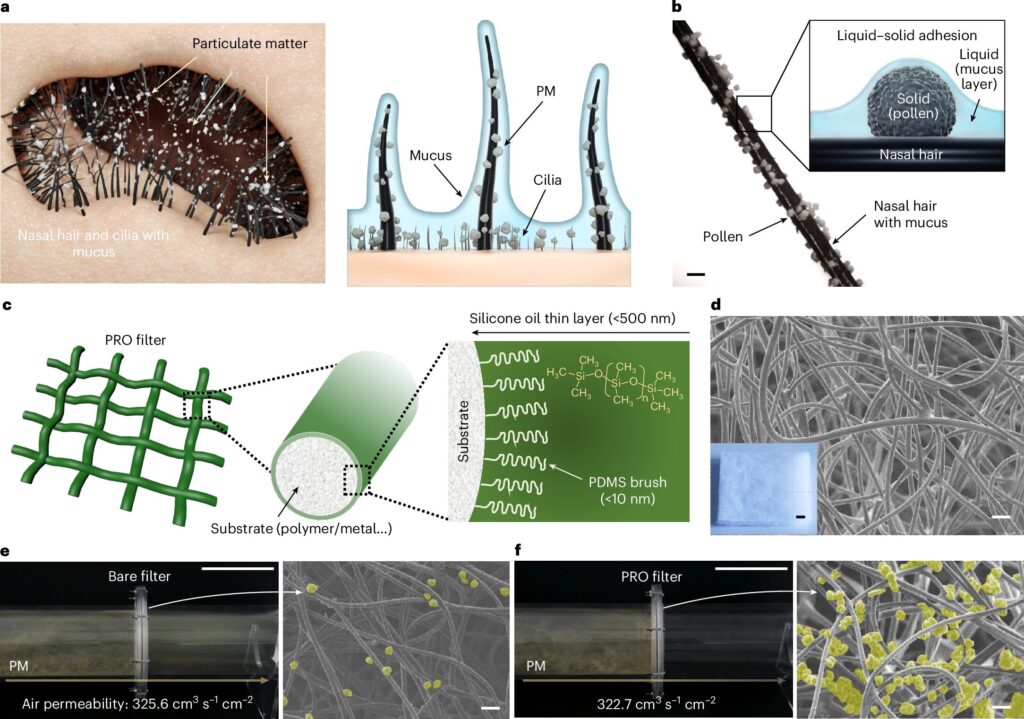One of the problems of conventional filters used in homes, businesses and public spaces is their poor performance. They rely on weak van der Waals forces to capture particles like dust and pollen, meaning they let a lot of stuff slip through. Nature, however, does the job a whole lot better.
Drawing inspiration from the human body, chemical engineers at Chung-Ang University in South Korea designed an air filtration system that mimics the mucus layer coating nasal hairs.
Nasal mucus is the perfect trap
The nose is a highly efficient air filter, trapping tiny contaminants before they can enter your lungs. When you breathe in, airborne particles become trapped in the sticky mucus thanks to capillary adhesion. This is a force that helps pull the particles into the sticky layer and hold them there. Hair-like structures called cilia then move them to the back of the throat, where they are either expelled or swallowed.
In this new research published in the journal Nature, engineers coated filters with a thin layer (200 to 500 nanometers) of stable, biocompatible and non-volatile oil. The film created a sticky surface that acted in a similar way to nasal mucus.
To test the efficiency of their new filter system, called a particle-removing oil-coated filter (PRO), the team ran a series of field tests at several sites in Seoul, including an exhibition hall, an office building and an indoor baseball stadium. They found the PRO filter captured significantly more particles than traditional filters and lasted twice as long.
“Our bioinspired filter demonstrates that a stable, thin liquid layer can dramatically enhance particle capture and retention, offering a new paradigm for efficient, long-lasting, and energy-saving air filtration,” explained Junyong Park, lead author of the study.
Another benefit of these nature-inspired PRO filters is that they even work well in windy conditions, which would make them ideal in places like construction sites and metro stations. With traditional filters, strong gusts can dislodge particles and blow them back out into the air.
What’s next?
The researchers believe their work could lead to better air purifiers and HVAC systems for buildings and public spaces. And cleaner indoor and outdoor air means healthier environments. This does not have to be expensive either, since PRO filters can be added to existing systems. There’s no need to replace them.
Next, the team plans to develop a solid material with a liquefied surface and use it as a thin coating on filters. These new filters would have built-in electrostatic charges to help trap particles in water.
Written for you by our author Paul Arnold,
edited by Gaby Clark, and fact-checked and reviewed by Robert Egan—this article is the result of careful human work. We rely on readers like you to keep independent science journalism alive.
If this reporting matters to you,
please consider a donation (especially monthly).
You’ll get an ad-free account as a thank-you.
More information:
Junyong Park et al, Bioinspired capillary force-driven super-adhesive filter, Nature (2025). DOI: 10.1038/s41586-025-09156-y
© 2025 Science X Network
Citation:
Filters inspired by nose hair and nasal mucus promise cleaner air (2025, July 10)
retrieved 11 July 2025
from https://techxplore.com/news/2025-07-filters-nose-hair-nasal-mucus.html
This document is subject to copyright. Apart from any fair dealing for the purpose of private study or research, no
part may be reproduced without the written permission. The content is provided for information purposes only.

